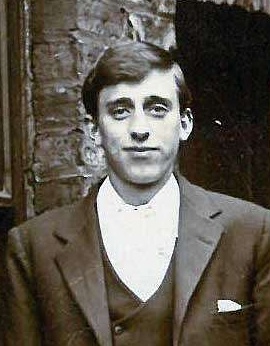
Alfred Myers came from a large family in East Cleveland and before the war worked with two of his brothers in the ironstone mines. A member of the Independent Labour Party and a devout Wesleyan Methodist, he played a key role in his local community. He was a tenor in the Wesleyan Carlin How choir, a Sunday school superintendent and trustee of the local church.
Myer’s service record survives and records the process of his arrest and sentencing in cold, hard terms. One month after his posting he was arrested and court-martialled. Initially he was sentenced to death but this was commuted to 10 years imprisonment.
At his hearing for exemption from compulsory military service, Myers asserted his belief in an international brotherhood of man, and stated that he ‘could not conscientiously kill, nor assist in killing’. But like so many others he was only granted exemption from combatant service and was sent to the Non-Combatant Corps at Richmond Castle.
In the cells at Richmond, Myers’s tenor voice was put to good use. With two other conscientious objectors, Brocklesby and Gaudie, he sang the hymn ‘Nearer My God to Thee’ in three-part harmony. Myers’s performance wasn’t as perfect as the other prisoners hoped, however – they had to bang on the cell floor to keep him in time.
Following his ordeal with the rest of the Richmond Sixteen in France, Myers was sent first to Dyce Camp, near Aberdeen, and then Maidstone prison. Others of the Richmond Sixteen were also there, and Myers worked alongside Brocklesby in the laundry.
On his release, the effects of imprisonment were evident. Brocklesby described in his memoirs how on their journey home ‘poor old Alfred … was suffering from an emotional or nervous reaction and felt unable to go further alone’.
Explore more memories from the ribbon
-
Lt Henry Stanley Tempest Bullen
Jennifer Bullen visited the museum to show us the memorial plaque to Lt Henry Stanley Tempest Bullen, her father-in-laws elder brother. Harry Bullen of ‘D’ Battery, 251st Brigade of the Royal Field Arilltery was Killed in Action on 14th April 1917 during the Battle of Arras (an action launched in support and as a diversionary action to the larger French offensive on the Chemin des Dames). He died at the age of 20 and is buried south of Arras at Beaurains Road Cemetery, which was designed by Sir Edwin Lutyens. His mother, Edith Bullen lived in Gosforth, Northumberland. A memorial window to Lt Bullen was erected in St Nicholas Church, Gosforth following the war.
-
Captain T E Dufty
Captain Thomas Ernest Dufty was born in on the 30th of June 1880. His father was Arthur Richard Sykes Duffy and his mother was called Katie. He was educated at Pocklington Grammar School. He joined the 5th Battalion in 1912 and became a lieutenant in June 1913. Prior to this his profession was as a banker and manager of the Bridlington branch of the London Joint Stock Bank. Duffy was promoted to Captain on the 18th of April 1915. He was reported as killed in action on or about the 19th of May 1915 (killed by a shell). His Battalion had been deployed to Sanctuary Wood (1.9 miles east of Ypres). His whistle and blood stained scarf are on display at the Green Howards Museum. He left a widow, Beatrice, and a 4-year-old son Arthur Richard. He is buried at the Vlamertinghe Military Cemetery in Belgium and commemorated at the Manor Road Cemetery Scarborough.
-
Joseph Snowden Atkinson
Submitted by Mavis Marwood a resident of Richmond for the last 10 years. Private Joseph Snowden Atkinson (204103) was my grandfather. He was born in Gainford and lived in Ravensworth. Like his father his occupation was as a stonemason. He served in France during the war and was one of the lucky soldiers to survive the conflict. One of the images is a handmade Christmas card that he sent from the front line to my mother when she was little girl. On his return to Ravensworth he went on to become a master stonemason.
